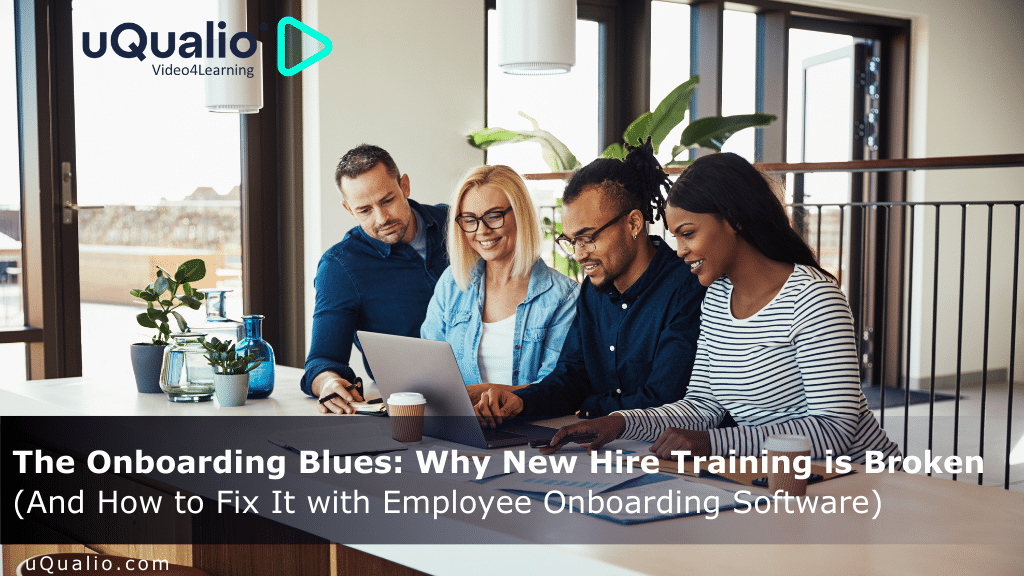Introduction
In the dynamic landscape of corporate training, traditional methods are giving way to innovative solutions that harness the power of technology. Video training platforms for businesses have emerged as the cornerstone of modern training programs for virtual audiences. These platforms revolutionize learning experiences by integrating multimedia elements, scalability, cost-effectiveness, customization, and analytics.
Let’s find out what video training platforms are and what they are capable of, before we dig deep into why more and more businesses are embracing these video eLearning software solutions.
What Are Video Training Platforms for Businesses?
Video training platforms are specialized SaaS eLearning solutions crafted to revolutionize how organizations and institutions approach training and learning. They are meticulously designed to streamline the creation, delivery, and management of educational content, with a primary focus on video formats.
Unlike traditional training methods, these video training platforms for businesses offer dynamic and interactive learning experiences, engaging learners in ways that go beyond static materials or in-person sessions. By incorporating multimedia elements, video training software caters to a wide array of learning preferences, ensuring that employees can absorb information effectively.

Accessibility
Accessibility lies at the heart of video eLearning solutions. They enable learners to access content at their convenience, regardless of time or location. Whether learners are in the office, working remotely, or on the go, they can seamlessly engage with training materials on any device. This flexibility enhances the learning experience. Moreover, it accommodates the diverse needs of modern work environments, where flexibility and mobility are paramount.
Scalability
Scalability is another hallmark feature of video training platforms for businesses. They are designed to adapt to the evolving needs of businesses. Plus, they can accommodate varying numbers of users without compromising the quality of instruction. Whether a company has a small team – or a large workforce spread across various locations, video-based learning platforms can effectively deliver consistent and high-quality training experiences to all types of audiences.
Reporting & Analytics
Video eLearning solutions often come equipped with robust analytics and tracking tools. These features empower businesses to monitor learner progress, assess the effectiveness of training programs, and identify areas for improvement. By leveraging data-driven insights, organizations can refine their training strategies, optimize learning outcomes, and make informed decisions to support employee development and growth.

In essence, these solutions represent a modern and adaptable approach to workforce development. They offer businesses the means to deliver high-quality training content in a flexible, accessible, and scalable manner.
As companies continue to prioritize employee training and development in an ever-changing landscape, video training software emerges as invaluable tools for driving performance, enhancing skills, and fostering a culture of continuous learning.
Now, let’s delve into why businesses are increasingly turning to video training platforms to achieve their training objectives.
Enhanced Engagement and Retention
As attention spans dwindle and distractions abound, keeping learners engaged is a constant challenge for businesses. Video-based employee training platforms offer a solution by captivating audiences with multimedia-rich content that stimulates both the visual and auditory senses. Let’s look at how these solutions enhance engagement and retention, fostering an environment for effective learning for employees.

- Leveraging Multimedia for Enhanced Learning: One of the key advantages of video-based training is its ability to incorporate multimedia elements such as audio, visuals, and interactive components. Studies have shown that multimedia-rich content not only captures learners’ attention but also enhances their retention of information. By presenting complex concepts in a visually compelling manner, video eLearning solutions facilitate better comprehension and knowledge retention among learners.
- Cognitive Impact of Visual Content: Visual content has a profound impact on cognition, making it an invaluable tool for education and eLearning. By engaging multiple senses simultaneously, videos stimulate cognitive processes and improve information processing efficiency. This leads to higher levels of engagement and retention, compared to traditional text-based learning materials.
- Personalized Learning Paths: Video training platforms for businesses offer the flexibility to create personalized learning paths tailored to individual learner needs. Taking advantage of features like gamification and microlearning, businesses can deliver bite-sized training modules that cater to diverse learning preferences and pace. Personalized learning paths empower employees to take ownership of their development journey, leading to greater motivation and satisfaction.
White-Label Customization with Video Training Platforms for Businesses
A white-label video eLearning platform empowers businesses to personalize their training experience to reflect their unique brand identity. Here is how a white label training solution empowers organizations to create cohesive, branded, and effective learning environments that meet their unique training objectives and organizational needs.

- Brand Identity Integration: The white-label customization enables businesses to seamlessly integrate their brand identity into the user experience. From logos and color schemes to API integration, iFrame embedding to a headless solution, organizations can ensure that every interaction with the platform reinforces their unique brand image. By incorporating brand elements throughout the interface, including login screens, headers, and footers, users feel a sense of continuity and trust. This aids in enhancing brand recognition and loyalty.
- Customizable Content Presentation: With the white-label customization capabilities, businesses can tailor the training content to align perfectly with their brand. Whether it’s about adjusting the layout or embedding company-specific messaging within the videos, organizations have the flexibility create a cohesive and engaging learning environment. By offering customizable options for quizzes, micro-credentials, and gamification, companies can deliver content that not only educates but also captivates their audience. This allows for a more immersive and effective learning experience.
- Administrative Control and User Management: The white-label customization feature extends beyond aesthetics to provide comprehensive administrative control and user management functionalities. Administrators have the power to customize user permissions. This ensures that access to content and features aligns with each user’s role and responsibilities. From creating channels, user groups, and assigning specific access rights to tracking individual progress, white-label platforms offer robust tools for effective administration and oversight. With control over course and user management settings, businesses can optimize the platform to meet their unique organizational needs while maintaining security and compliance standards.
Scalability and Accessibility
In a world where remote work is becoming increasingly prevalent, the need for scalable and accessible training solutions has never been greater. Video-based training platforms offer businesses the flexibility to reach a global audience with ease. They break down geographical barriers while empowering employees to learn anytime, anywhere. Let’s explore how these platforms facilitate seamless training delivery and accessibility for distributed teams.

- Breaking Geographical Barriers: One of the most significant advantages of video-based training solutions is their ability to break geographical barriers. Regardless of their location, employees can access training materials anytime, anywhere, as long as they have an internet connection. This eliminates the need for costly travel arrangements and allows businesses to reach a global audience with minimal logistical constraints.
- On-Demand Learning Anytime, Anywhere: Virtual learning platforms empower employees to engage in on-demand learning experiences at their convenience. Whether it’s during downtime at work or from the comfort of their homes, learners can access training materials whenever they need them. This flexibility not only enhances productivity but also ensures that learning is integrated seamlessly into employees’ busy schedules.
- Consistency Across Distributed Teams: For businesses with distributed teams, maintaining consistency in training delivery can be challenging. Video training platforms provide a standardized framework for delivering training content. This ensures that all employees receive the same high-quality learning experience regardless of their location. This consistency fosters a sense of unity and cohesion among team members, driving alignment towards organizational goals.
Cost-Effectiveness and Efficiency
In an era where every dollar counts, businesses are constantly seeking ways to optimize their training expenditures without sacrificing quality. Video-based training software offers a cost-effective solution by eliminating the need for expensive in-person training sessions and printed materials. Let’s examine how these solutions streamline onboarding processes, reduce training expenses, and save valuable time for both instructors and learners.

- Reduction in Training Expenses: Investing in video training platforms can yield significant cost savings for businesses compared to traditional training methods. They eliminate expenses related to venue rentals, travel, and printed materials. This allows organizations to allocate resources more efficiently towards improving the quality and accessibility of training content. Moreover, video-based learning reduces the need for repetitive in-person training sessions, saving both time and money in the long run.
- Streamlined Onboarding Processes: Video training platforms for businesses streamline the onboarding process by providing new hires with access to comprehensive training materials from day one. Instead of relying on time-consuming orientation sessions, they can complete employee onboarding modules at their own pace. This allows them to understand their roles more efficiently. This accelerates the integration of new hires into the workforce. It also reduces the burden on HR and training departments.
- Time-Saving Benefits for Instructors and Learners: From an instructor’s perspective, video-based training platforms offer time-saving benefits by automating repetitive tasks. By pre-recorded video training modules, instructors can focus their time and energy on refining course content and addressing learner feedback. Similarly, learners benefit from the flexibility to pause, rewind, and revisit content as needed. This allows them to learn at their own pace without feeling rushed.
Tailored Learning Journeys with Video Training Platforms for Businesses
One size does not fit all when it comes to employee training. Each individual brings unique skills, experiences, and learning preferences to the table. Video-based training solutions recognize this diversity and empower businesses to create customized learning journeys tailored to specific job roles and responsibilities. Here is how these video eLearning solutions enable organizations to deliver personalized training experiences.

- Tailoring Content to Specific Job Roles and Responsibilities: One of the strengths of video training platforms for businesses lies in their ability to tailor content to specific job roles and responsibilities. Whether it’s sales techniques or compliance training, businesses can curate tailored training. This helps address the specific needs of different departments and functions. This targeted approach ensures that employees receive relevant and actionable information that directly contributes to their success in their roles.
- Adjusting Content Based on Learner Feedback and Performance: Video training solutions facilitate continuous improvement by allowing businesses to gather feedback and performance data from learners. By analyzing metrics such as completion rates and quiz scores, organizations can identify areas for improvement and adjust content accordingly. This iterative approach ensures that training materials remain up-to-date, relevant, and aligned with evolving business needs.
- Flexibility in Learning Paths to Accommodate Varied Learning Speeds: Every employee has a unique learning style and pace. So, video training platforms for businesses accommodate these differences by offering flexible learning paths. Learners can choose to either watch the entire course or consume content in smaller increments over time. The choice could be based on what works best for them. This flexibility fosters a culture of continuous learning where employees feel empowered to pursue professional development at their own pace.
Analytics and Performance Tracking with Video eLearning Platforms
In today’s data-driven world, insights are key to driving continuous improvement and achieving business objectives. Video-based training solutions offer robust reporting and analytics capabilities. It helps provide organizations with valuable insights into the effectiveness of their training programs. Let’s delve into how these video-based microlearning platforms enable businesses to measure ROI, monitor learner progress in real-time, and make data-driven decisions to optimize training outcomes.

- Data-driven Insights for Improvement: One of the most valuable features of video training platforms for businesses is their ability to provide data-driven insights for improvement. By analyzing learner behavior and engagement patterns, businesses can gain valuable insights into the effectiveness of their training programs. From identifying popular courses to pinpointing areas of low engagement, analytics enable organizations to make informed decisions about resource improvement.
- Real-Time Progress Monitoring: Video eLearning software offers real-time progress. They help monitor capabilities that allow instructors and administrators to track learner progress and performance. Whether it’s monitoring completion rates or quiz scores, real-time data enables timely intervention and support for struggling learners. This proactive approach ensures that employees receive the necessary assistance, ultimately driving better outcomes for individuals and the organization.
- Measuring ROI and Training Effectiveness: Finally, video training solutions enable businesses to measure the ROI of their training initiatives and assess their overall effectiveness. By tracking metrics, like employee performance improvements and skill acquisition, organizations can quantify the impact of training on business outcomes. This data-driven approach helps justify training expenditures. Plus, it provides valuable insights for refining future training strategies and maximizing ROI.
The Future of Corporate Learning: Video Training Platforms for Businesses
With video-based training, businesses can transform their L&D programs from mundane tasks into victories for employees and the organization. Enhancing employee skills, boosting productivity, or fostering a culture of continuous learning, the adoption of video training platforms marks a paradigm shift in how organizations approach employee development.
As we look towards the future, it’s clear that the evolution of technology will continue to shape the landscape of corporate training. Embracing video-based learning is not just a strategic choice. But, it’s a necessity for businesses striving to thrive in an ever-changing world.

In a world where agility and adaptability are paramount, video training platforms for businesses like uQualio Video4Learning offer the flexibility and scalability needed to meet the diverse needs of modern workplaces. By providing on-demand access to training content, breaking down geographical barriers, and empowering personalized learning journeys, these platforms lay the foundation for success.
Overall, the journey from video to victory is not just about adopting new technology. Rather, it’s about embracing a mindset of innovation and continuous improvement. By leveraging the power of video-based training, businesses can unlock the full potential of their workforce and achieve lasting success.
Achieve Effective & Affordable Video Training
– uQualio is an award-winning, easy-to-use, all-in-one NextGen LMS software for any types of online video training.











